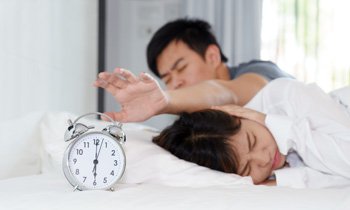The Clock Is Ticking: The Fine Line Between Enough Sleep, Too Much Sleep, And Early Death
Studies in Great Britain have recently clearly demonstrated that not enough sleep, quite simply, leads to early death. The popular British periodical The Mirror has stated that sleeping less than six hours per night can make you 12-15% more like to die sooner than a person who sleeps a solid 8 hours a night.
One study compared how sleep duration relates to death statistics, surveying participants over the age of 60 with several variations of the study spanning 4-25 years, yielding a lot of insight into the importance of steadily sleeping 8 hours per night, and avoiding sleep deficits.

Interestingly, the same study suggested that there was a 30% increase in risk of death for persons who slept for more than 9 hours per night. It’s important to note though, that there are several variables in play that affect these results.
Insufficient sleep greatly affects our health, specifically our blood pressure, hormone production that is essential for our organ systems to remain healthy, and brain function, like recall, memory, and energy levels, all of which can make us considerably healthier or sicker, which affects death rates and early death statistics.
One interesting study about longevity and sleep followed a group of 21,000 twins for longer than 22 years. Twins are ideal subjects for studies since they likely are up in identical environments and have similar biological and genetic footprints. Researchers can then separate the impact of a particular behavior such as sleep time, and tie it directly to a result such as lifespan and longevity.
The study focused on gathering data at the start of the study and then accumulating additional information a full 22 years later. Queries included time logged for nightly sleep, use of prescription drugs for sleep, and details about sleep habits and hygiene, as well as the quality of sleep.

The results were pretty remarkable and alarming. For twins who slept less than 7 hours, or more than 8 hours a night, their risk of death escalated by 17-24 percent, a scary and marked increase. This suggest that there is a fine line between sleeping too little, or too much.
To make matters worse, use of prescription sleep medications further increased mortality risk by 33%, which was an alarming find. Of course, the amount of sleep required by any given individual may vary greatly. Plenty of people in their 90’s sleep 6-7 hours per night, and many of them can be long sleepers, requiring 9 hours of sleep per night or more.
Other research indicates that sleeping less than 7 hours per night can damage the cardiovascular system, create stress on endocrine systems, and cause damage to our central nervous system. Side effects of insufficient sleep can be increased likelihood of obesity, diabetes, even psychological problems such as depression and anxiety.
Addiction problems with drugs and alcohol, which can be exacerbated by poor sleep or bad sleep hygiene, tends to increase when an individual is not getting enough deep, restorative sleep.

Bottom line, the amount of sleep we need is a very finely tuned mechanism. The subtle biochemistry of our serotonin and melatonin levels, how our body follows cues from nature with natural light, and the intrusion of technology and bright light emitting devices, all contribute to whether or not we get the sleep we need.
To hit that sweet spot number of hours, you need to be disciplined and willing to modify your behavior to insure that you get the ideal profile of 7-8 hours, and not a lot less or more. To do this, we suggest scheduling your evenings and your mornings with sleep and rest having the utmost priority in your life.
Having a sleep sanctuary is the most important element in the process. Creating a nest, a place which is custom designed to be your retreat, can be easily created. Most importantly it begins with an outstanding mattress.
Lifestyle changes can be tough, too, and the best way to start a new program might be to chart out your daily schedule. We suggest defining a time for dinner and sticking with it, especially Monday through Thursday, since Friday and Saturday evenings have so many variables that affect sleep habits.
Eat dinner no later than 7PM, and if you hit the gym, do that at least an hour or more before you eat. After you eat, hit the shower, as this has been shown to both relax muscles and to calm the nervous system. Also, a very important element: do no use devices or watch TV an hour before bedtime, so if you are shooting to be asleep at 10 PM, let’s say, then you want to tell your brain that it’s dark, and not trick it into thinking you’re outside and it’s noon. Blue or white light keep the brain active and alert- to a point- and avoiding it well before you fall asleep is essential.
There are plenty of studies to clearly show that taking a shower prior to sleep cools the body, which stimulates melatonin production and other endocrine systems to prepare your body for sleep.

After showering find a relaxing activity, like reading or engaging in conversation with your partner. Do this in an area other than your bedroom. Your bedroom should be used for two things, if you really want to create your sanctuary: sleeping and sex. If you program your mind and establish patterns, the bedroom will become a place for positive and relaxing experiences, not a hardwired, noise infested bright light nightmare.